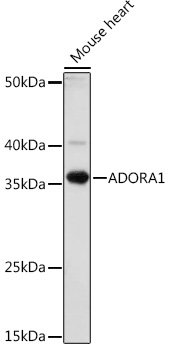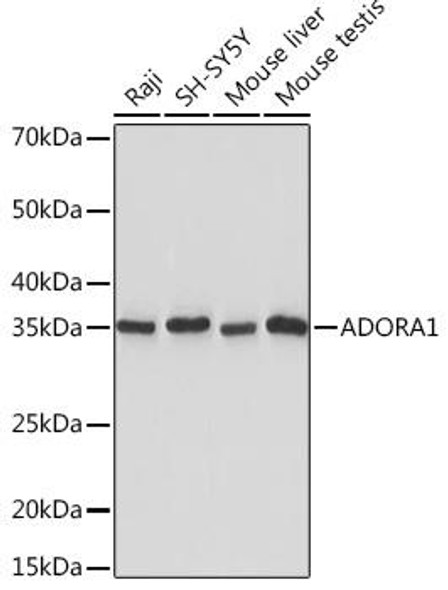Cell Biology Antibodies 15
Anti-ADORA1 Antibody (CAB18525)
- SKU:
- CAB18525
- Product Type:
- Antibody
- Reactivity:
- Human
- Reactivity:
- Mouse
- Reactivity:
- Rat
- Host Species:
- Rabbit
- Isotype:
- IgG
- Research Area:
- Cell Biology
Description
| Antibody Name: | Anti-ADORA1 Antibody |
| Antibody SKU: | CAB18525 |
| Antibody Size: | 20uL, 50uL, 100uL |
| Application: | WB IHC |
| Reactivity: | Human, Mouse, Rat |
| Host Species: | Rabbit |
| Immunogen: | Recombinant protein of human ADORA1. |
| Application: | WB IHC |
| Recommended Dilution: | WB 1:500 - 1:2000 IHC 1:50 - 1:200 |
| Reactivity: | Human, Mouse, Rat |
| Positive Samples: | Mouse heart |
| Immunogen: | Recombinant protein of human ADORA1. |
| Purification Method: | Affinity purification |
| Storage Buffer: | Store at -20°C. Avoid freeze / thaw cycles. Buffer: PBS with 0.02% sodium azide, 50% glycerol, pH7.3. |
| Isotype: | IgG |
| Sequence: | Email for sequence |
| Gene ID: | 134 |
| Uniprot: | P30542 |
| Cellular Location: | |
| Calculated MW: | |
| Observed MW: | 37kDa |
| Synonyms: | RDC7, ADORA1 |
| Background: |
| UniProt Protein Function: | ADORA1: Receptor for adenosine. The activity of this receptor is mediated by G proteins which inhibit adenylyl cyclase. Belongs to the G-protein coupled receptor 1 family. 2 isoforms of the human protein are produced by alternative splicing. |
| UniProt Protein Details: | Protein type:Membrane protein, integral; Membrane protein, multi-pass; Endoplasmic reticulum; Receptor, GPCR; Apoptosis; GPCR, family 1 Chromosomal Location of Human Ortholog: 1q32.1 Cellular Component: integral to plasma membrane; plasma membrane Molecular Function:protein binding Biological Process: cell-cell signaling; inflammatory response; nervous system development; phagocytosis; signal transduction |
| NCBI Summary: | The protein encoded by this gene is an adenosine receptor that belongs to the G-protein coupled receptor 1 family. There are 3 types of adenosine receptors, each with a specific pattern of ligand binding and tissue distribution, and together they regulate a diverse set of physiologic functions. The type A1 receptors inhibit adenylyl cyclase, and play a role in the fertilization process. Animal studies also suggest a role for A1 receptors in kidney function and ethanol intoxication. Transcript variants with alternative splicing in the 5' UTR have been found for this gene. [provided by RefSeq, Jul 2008] |
| UniProt Code: | P30542 |
| NCBI GenInfo Identifier: | 231473 |
| NCBI Gene ID: | 134 |
| NCBI Accession: | P30542.1 |
| UniProt Secondary Accession: | P30542,Q6FHK3, Q8TAM8, A6NFY5, A6NGP4, A8K1L3, B3KXQ4 D2CGD0, |
| UniProt Related Accession: | P30542 |
| Molecular Weight: | 13,348 Da |
| NCBI Full Name: | Adenosine receptor A1 |
| NCBI Synonym Full Names: | adenosine A1 receptor |
| NCBI Official Symbol: | ADORA1 |
| NCBI Official Synonym Symbols: | RDC7 |
| NCBI Protein Information: | adenosine receptor A1 |
| UniProt Protein Name: | Adenosine receptor A1 |
| Protein Family: | Adenosine receptor |
| UniProt Gene Name: | ADORA1 |
| UniProt Entry Name: | AA1R_HUMAN |







